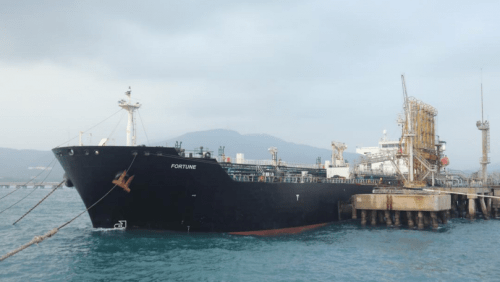Iran is providing Venezuela with 1.53 million barrels of gasoline and refining components in a move criticized by U.S. authorities as both countries are under U.S. sanctions, according to the governments, sources and calculations by TankerTrackers.com.
Refinitiv Eikon data showed that the tanker Fortune docked at one of El Palito’s berths around 1 a.m. local time (0500 GMT).
Tareck El Aissami, Venezuela’s economy vice president and recently named oil minister, thanked Iran for sending “fuel, additives and spare parts” to increase fuel distribution and boost refinery output in the gasoline-starved country and criticized U.S. sanctions.
“We are fortunate to be able to count on Iran in these times,” El Aissami said from El Palito, calling the Fortune a “symbol of the brotherhood and solidarity” between Iran and Venezuela. “We cannot allow any world power to act like a super-police.”
A second vessel, the Forest, entered Venezuelan waters on Monday and was also heading to El Palito, according to its trajectory shown on the Eikon data. A third tanker, the Petunia, was approaching the Caribbean.
A senior Trump administration official said earlier this month Washington was considering a response to the shipments. A Pentagon spokesman said last week he was not aware of any military move planned. The first two vessels did not appear to face interference.
Neither the White House nor the State Department responded to requests for comment on Monday, an American holiday.
Venezuela is suffering gasoline shortages due to the near-collapse of its 1.3 million barrel-per-day refining network after years of underinvestment, as well as U.S. sanctions aimed at ousting socialist President Nicolas Maduro.
Venezuela’s refining network in May increased its joint crude processing rate to about 215,000 barrels per day (bpd) from 110,000 bpd in March, following the arrival of spare parts supplied in flights by Iran’s Mahan Air, according to three people familiar with the matter, who spoke on condition of anonymity.
The 146,000-bpd El Palito refinery is now restarting its fluid catalytic cracker, a key unit for finished fuel production, one of the people said. The 187,000-bpd Puerto la Cruz refinery, which serves Venezuela’s eastern region, remains out of service, the people said.
Reuters
